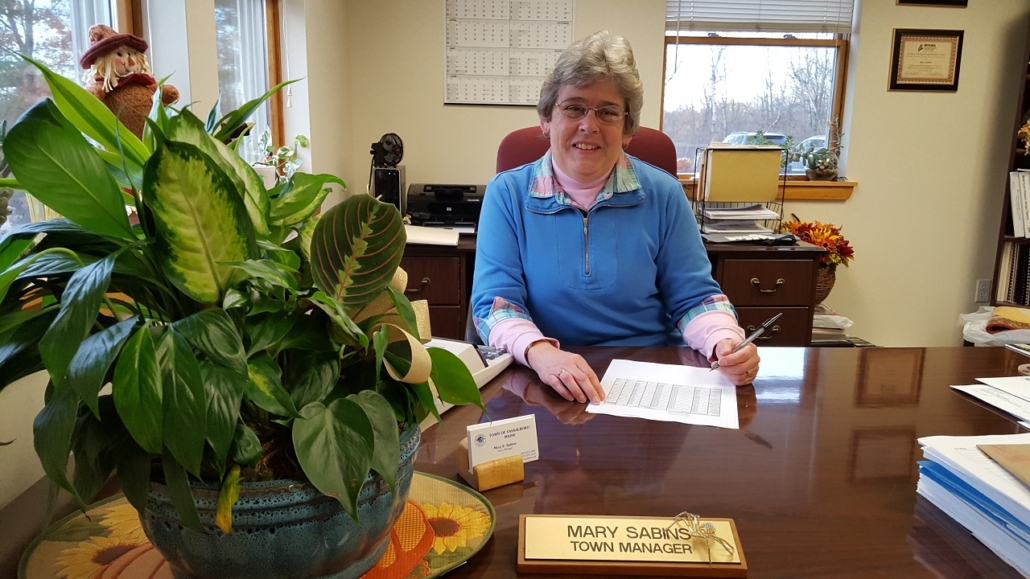Selectmen choose to ditch single-sort recycling; instead, put all in trash compactor
 by Mary Grow
by Mary Grow
Vassalboro selectmen spent much of their Jan. 24 meeting talking about trash disposal, making decisions that will impact residents and local trash haulers.
They began the evening with plans to sign a single-sort recycling contract and put out a request for bids for hauling recyclables and mixed waste, separately. By the end of the discussion they agreed to abandon single-sort recycling and put everything into the trash compacter; and Town Manager Mary Sabins needed to amend the bid request.
Residents and trash haulers who have been separating recyclables do not need to continue.
The main reason for the change: board member John Melrose argued that when the new Coastal Resources (formerly Fiberight) plant in Hampden opens, its fancy machinery will recycle more items more efficiently than the town can.
Specifically, he said, paper and cardboard will be pulled out of the waste stream and pulped; organic materials will go into an anaerobic digester; and plastics will be sold or turned into fuel.
A 1995 amendment to Vassalboro’s Solid Waste Ordinance requires recycling cardboard and yard wastes, Sabins said. Selectmen debated, without deciding, whether recycling at Coastal Resources was adequate or whether they should ask voters to repeal the amendment.
Sabins’ draft request for transportation bids asked for three-year contracts to haul solid waste and recyclables to the Norridgewock landfill until the Hampden facility opens, and then to Hampden.
By the end of the discussion, selectmen directed Sabins not to contract for recyclables and to remove the recyclables section from the bid requests.
They also decided to ask for a one-year contract because of another change they are considering: transporting waste in open-top tractor-trailers instead of the large metal boxes now used. They plan to seek more information on the possibility.
Melrose also has a proposal to redesign the transfer station to simplify the traffic pattern and to deal with the aged compactor and backhoe that are mainstays of solid waste disposal. The board postponed action on his suggestion that they hire a traffic engineer to review the current situation.
Melrose described his goals as to “use the existing site, minimize expense and make it better but not perfect.”
In other business, board Chairman Lauchlin Titus reported he had inspected some of Vassalboro’s streetlight locations and has asked Vassalboro Community School Principal Megan Allen to ask bus drivers if they think there are places where a new light would increase safety.
Titus recommends multiple new lights, mostly at intersections. He is, however, aware that neighbors might not be pleased, especially if lights shine into bedroom windows.
The survey is a preliminary step toward converting streetlights to LED (light-emitting diodes), a move selectmen expect would reduce electricity costs significantly. Titus and Melrose voted to renew the liquor license for Natanis Golf Course, with fellow board member and course owner Robert Browne abstaining.
Action was postponed on bids for a new town office photocopier while Sabins gets more information; on beginning the process of renewing the town’s cable TV franchise agreement, for the same reason (Sabins still awaits an answer to questions she emailed in November 2018); and on consideration of a proposed town Food Sovereignty Ordinance to be presented at the June town meeting, because the proponent could not attend the selectmen’s meeting.
The next Vassalboro selectmen’s meeting is scheduled for Thursday evening, Feb. 7, followed by a preliminary workshop on the 2019-2020 budget scheduled for 12:30 p.m. Tuesday, Feb. 12.




 Maine Drug Enforcement Agency investigations many times start with a tip from the public and now the agency has a new way for citizens to forward those tips, and do so anonymously. MDEA Director Roy McKinney said the agency gets an average of two dozen tips a month from concerned Maine citizens about suspected drug activity and many of those tips results in seizures of drugs and arrests.
Maine Drug Enforcement Agency investigations many times start with a tip from the public and now the agency has a new way for citizens to forward those tips, and do so anonymously. MDEA Director Roy McKinney said the agency gets an average of two dozen tips a month from concerned Maine citizens about suspected drug activity and many of those tips results in seizures of drugs and arrests.

